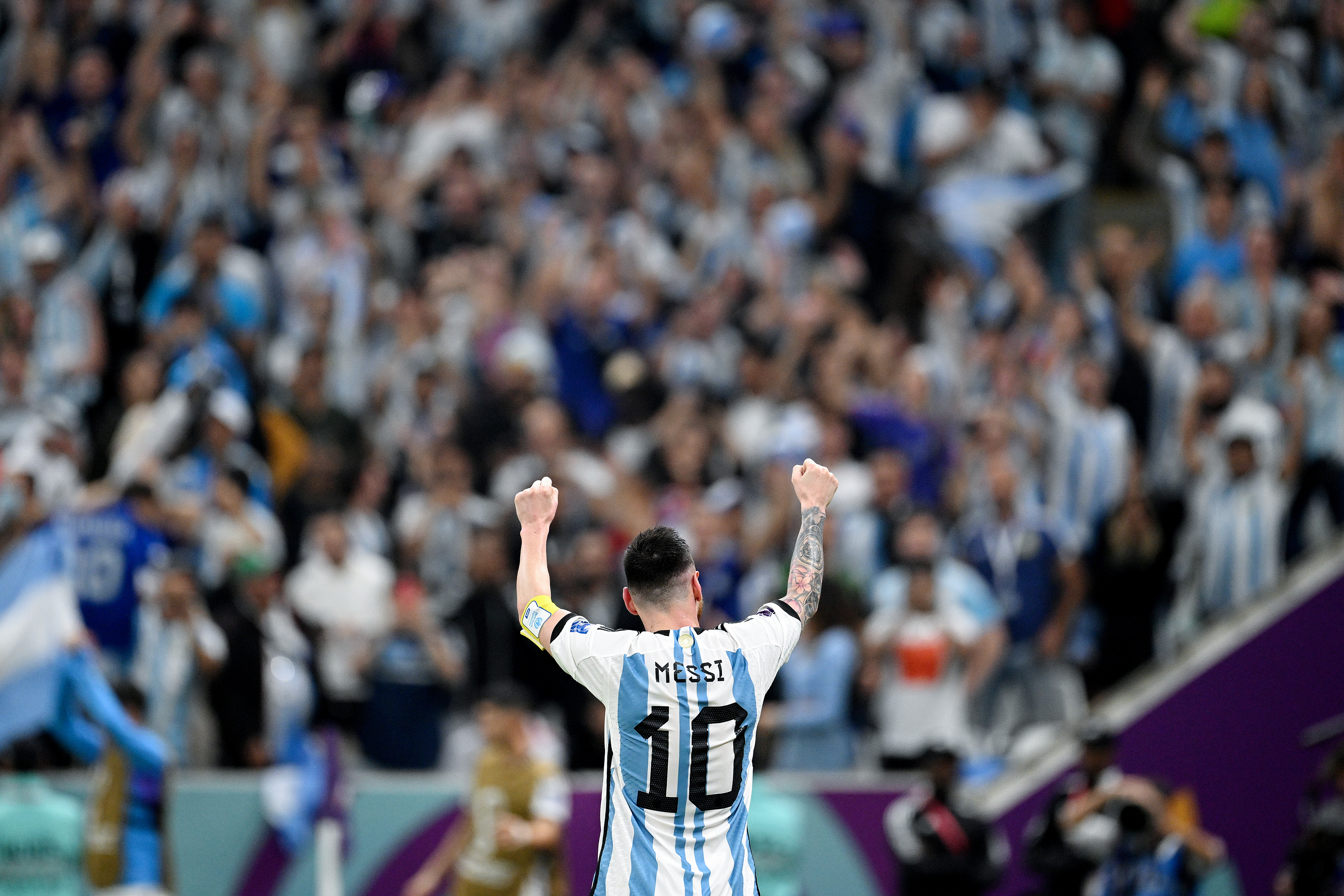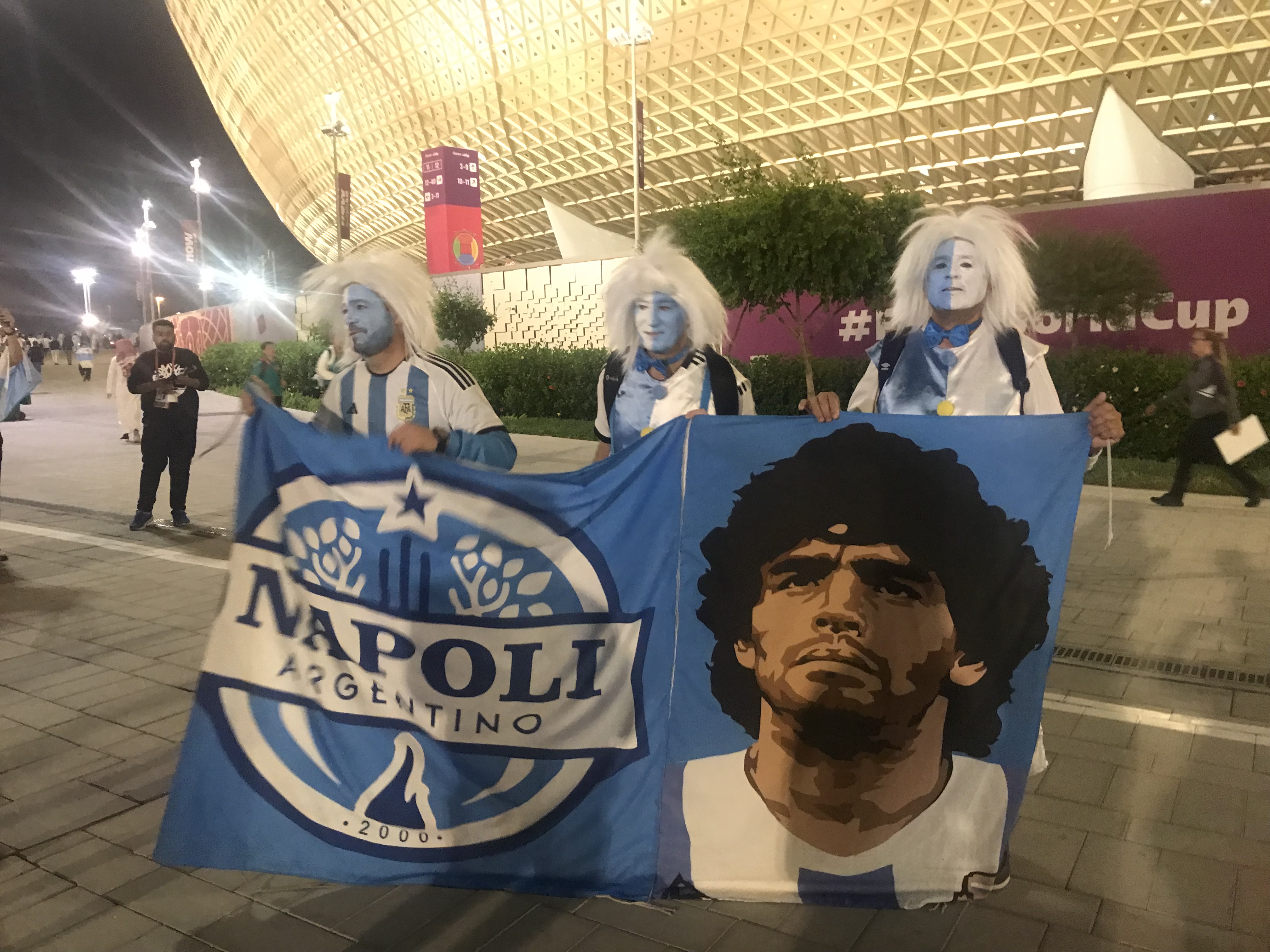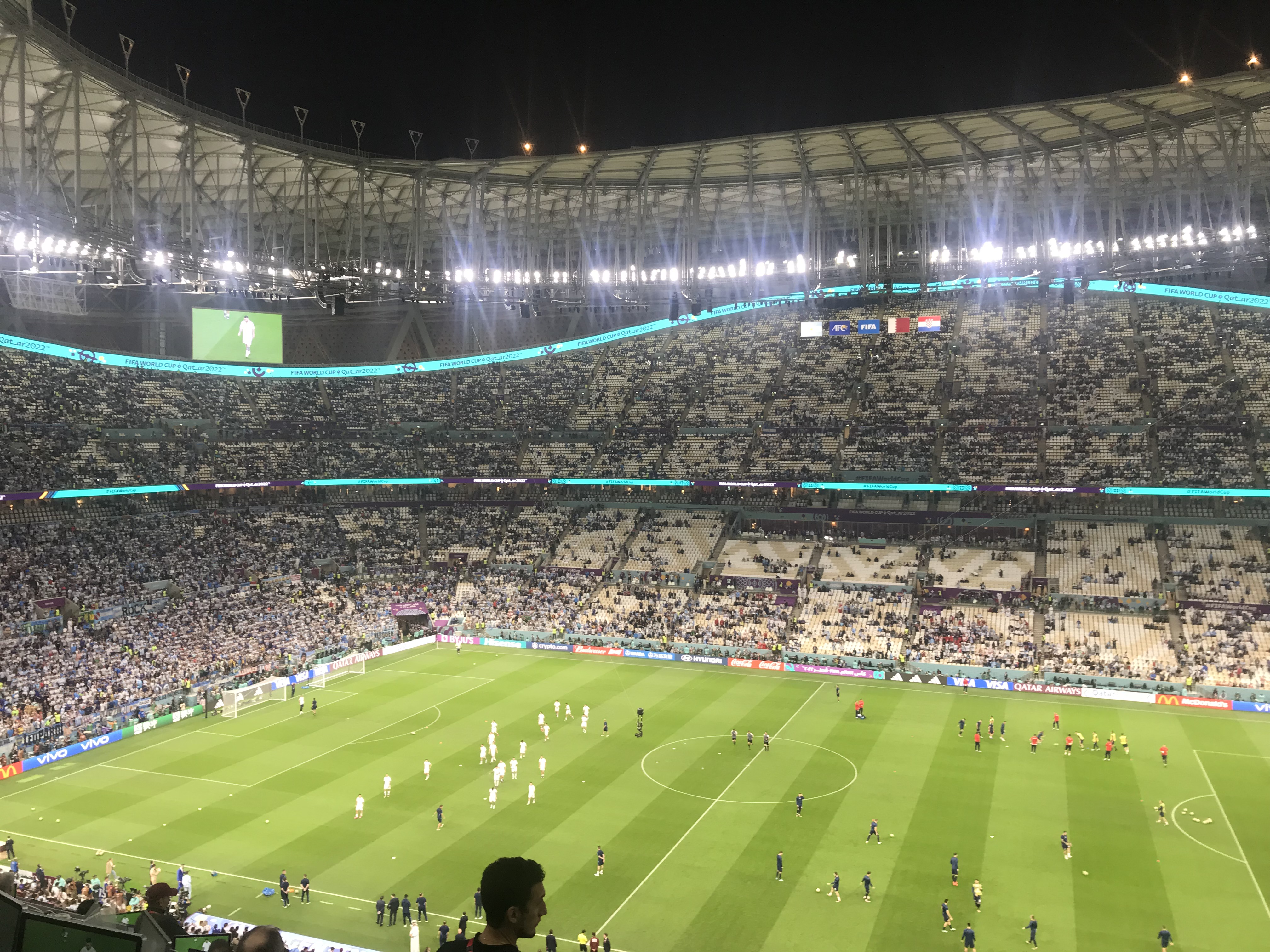Messi and the rise of La Scaloneta: how Argentina returned to the World Cup final
FFT were at the Lusail Stadium to see the Albiceleste defeat Croatia 3-0 and book their place in Sunday's showpiece

It was well past midnight inside Al Janoub's apartment village, but Argentina fans had gathered to sing and bang drums, in anticipation of the day ahead.
A few yards away, a giant flag hung from a window, gently fluttering in the wind. 'Orgullo nacional: Dios, el Papa y el Messias'. it read. 'National pride: God, the Pope and the Messiah'. The 'io' of Dios had been changed into a 10, to signify Diego Maradona. The Spanish word 'mesias' had acquired an extra s, in honour of Lionel Messi.
FFT have switched accommodation for the last few days of this tournament, leaving behind the portacabin village north of Lusail, which had begun to feel deserted, seemingly with more staff than guests, after the 28 of the countries at this World Cup went home, their fans leaving with them. As you travel around Doha, all eight World Cup stadiums remain lit up - no energy price problems around here - but some may never host top-class football again.
The apartment village at Al Janoub may be less handily located than the portacabins, situated as they are in the far south of the city, but it's just about the only accommodation in Qatar with sensible pricing, which explains why many of the remaining fans have headed here for the final stretch of Qatar 2022.

A dominant proportion of those remaining fans have been Argentines, knowing their team had two games still to play, win or lose against Croatia. FFT questions whether they really needed to have an impromptu game of football right outside our apartment window at 4.30am, but they've been determined to enjoy this World Cup from the very start - drinking and listening to music in the afternoon sun on matchday, ready for one the biggest matches they'd ever witness.
Until this semi final, the Albiceleste certainly had plenty of reasons to enjoy this tournament, and be confident of further success, largely thanks to Messi and their impressive boss Lionel Scaloni. "Today, Argentina will win," one proudly said as we reached the outside of the Lusail Stadium.
Four years ago, they almost crashed out of the World Cup in the group stage under Jorge Sampaoli, emphatically losing 3-0 to Croatia in their second fixture. If it looked like a shock at the time, it proved indicative - struggling for the right balance, for the symbiosis needed between Messi and the rest of the team, Argentina were gone by the last 16, while Croatia went on to the final.
"That was just genius...!"Lionel Messi leaves the commentary panel lost for words with this beautiful piece of skill to gift Argentina a third goal... 🙌🇦🇷#ITVFootball | #FIFAWorldCup pic.twitter.com/2KjMWqMjyADecember 13, 2022
Messi had helped the South Americans reach the World Cup final in 2014, but didn't shine on the biggest day of all against Germany, and had often failed to produce his best form for the national team, still waiting for their first trophy since 1993.
Get FourFourTwo Newsletter
The best features, fun and footballing quizzes, straight to your inbox every week.
Then Scaloni took charge in August 2018, initially as caretaker, having already worked as Argentina's under 20 boss, and as Sampaoli's assistant with the first team. Within months, he'd impressed enough to earn the job permanently, despite never managing at senior level before, even in the club game.
Still in his early 40s, after a playing career that saw him represent West Ham in the 2006 FA Cup final (the Gerrard final, as it became known), shortly before the Hammers signed fellow Argentines Carlos Tevez and Javier Mascherano, as a manager he proved to be the calming presence that the national team needed.
He showed tactical flexibility to switch between formations, convinced Messi to play on with the national team, and brought in uncapped players like Emiliano Martinez and Nahuel Molina, both of whom played key roles in Argentina's victory over the Netherlands in the quarter finals of this World Cup.
Finally, he made the Albiceleste into winners again, at the 2021 Copa America, against Brazil at the Maracana, of all places. Finally, Messi had an international trophy to his name.
Soon, Argentina were unofficial world champions too, beating Euro 2020 winners Italy 3-0 in La Finalissima at Wembley, going into the World Cup unbeaten in an astonishing 36 matches, dating back to 2019. The doubts had gone - no longer the sense that, eventually, something would go wrong.
That belief has held firm, despite this World Cup beginning with them losing to Saudi Arabia. Admittedly, they still dominated most of the game - they could have been 4-0 up at half time, but for several disallowed goals for offside.
Scaloni remained level-headed - Argentina have had a fall-out with the media at five of their previous six World Cups, but this time their manager perennially played the straightest of straight bats, displaying untapped cricketing potential.

He's not exactly come across as Mr Charisma, but that's not what Argentina need. When chaos is unfolding around them - from the mania of their fans in the stands, to the hostilities of their dramatic quarter-final on the field - Scaloni has stayed calm.
In his honour, this Argentina team have been labelled La Scaloneta, the sort of nickname that you could always imagine going into the history books if they won this World Cup. It actually came from a social media meme, of Scaloni driving a van in Argentina's colours, with La Scaloneta written on the roof. Like 'Ole's at the wheel', but more glamorous, and more successful.
At 35, Messi has been given the licence to remarkably play some of the best football of his international career at this tournament by Scaloni, providing quality whenever he's touched the ball. It seems remarkable now that a few months ago, he was struggling to score in Ligue 1, and didn't even make the 30-man shortlist for this year's Ballon d'Or. Win this tournament, and he might even claim the award for an eighth time.
Behind him, the team have fought like lions for him. Lisandro Martinez's last-gasp tackle to deny an Aziz Behich equaliser against Australia was the perfect example of such commitment.
All of that was why Argentina came into this semi final as favourites - even though Croatia still had many of the same players who proved so effective in 2018, particularly against the Albiceleste.
Their fans certainly hadn't travelled in the same numbers or garnered the same attention in Qatar, Miss Croatia aside, although they still had significantly more supporters in the Lusail Stadium than the Dutch did on Friday night.
Again though, the majority had turned up to watch Argentina and Messi, who was equalling Lothar Matthaus' long-held record of 25 World Cup appearances. Pretty much every match at this tournament has felt like a home game for the South Americans.
Scaloni again switched formation for this match, reverting to four at the back, with defender Lisandro Martinez making way for midfielder Leandro Paredes. Given Croatia's penchant for draws, it probably shouldn't have been surprising that the game began pretty cagily. With their midfield of Modric, Marcelo Brozovic and Mateo Kovacic, few teams are as adept at bossing possession as the Adriatic side - at times, Argentina were struggling to get the ball off them, let alone get Messi into the game.
Sometimes, Scaloni's men haven't exactly been free-flowing in open play, but they know what they need to do to win. Having Messi helps - when he finally did get on the ball, he was as elusive as ever, twisting, turning. It didn't matter if Croatia had four men around him, they couldn't dispossess him. Scaloni has smartly selected Julian Alvarez to do his running in recent matches, leaving out the misfiring Lautaro Martinez, freeing up Messi to provide moments of class.
Soon, another of those moments arrived for him at this tournament, from the penalty spot once more after Argentina finally found a chink in the Croats' armour, sending Alvarez away, before the Manchester City forward was felled by goalkeeper Dominik Livakovic.
For the third time in this World Cup, Messi stepped up to take a spot kick at the same end of the Lusail Stadium - just like against Saudi Arabia and the Netherlands, he made no mistake, this time emphatically rifling his penalty into the top corner, taking his tally for the tournament to five, surpassing his previous World Cup best of four in 2014. It moved him level with Kylian Mbappe in the golden boot race, too.
After both of Messi's previous penalties at the Lusail, Argentina crumbled, albeit rescuing the situation against the Dutch via a shoot-out. This time it was Croatia who folded - five minutes later, Messi again got a crucial touch to find Alvarez on the counter attack, before the forward picked up the ball and just kept running straight, Saaed Al-Owairan style.
Just like Belgium in 1994, the Croatian defence parted, somehow conspiring not to tackle him, giving it two attempts, only managing to give the ball straight back to Alvarez, who gave his thanks and fired the ball into the net. It was a stunning moment, a solo goal that will be remembered for some time, albeit with a slight hint of farce about it.
Did Messi get an assist for that? No, seemed to be the answer - the two attempted tackles denied him that. It could yet be crucial - if he ends the tournament level on goals with Mbappe, assists will decide the golden boot award. At that stage of the match, both had two assists each.
The Argentina fans didn't care. "Messi! Messi!" came the chant from the stands, a cry that has become increasingly common inside the Lusail Stadium over the past few weeks - this was the Albiceleste's fourth match at this venue. Whether they face France or Morocco in the final, their opponents won't have the same familiarity - neither will have played here at all.
After a half-time interlude, featuring an unexpected pitchside performance of 90s hit 'I Like To Move It' by Reel 2 Real, Messi almost added another goal - seeing his shot saved by Livakovic after a give-and-go. Unlike against the Netherlands, this time Scaloni's side were in little danger of letting their lead slip - measured, assured, determined.
With 21 minutes remaining, Messi did get his assist in scintillating fashion - in the battle of young versus old, prodigy versus the master, he sensationally turned rising star Josko Gvardiol inside out, then laid a second goal on a plate for Alvarez. It was a pleasure to be in the stadium to witness such genius - suddenly, the Flea was leading the golden boot race, too. This has very much become the Messi vs Mbappe World Cup.
Argentina fans celebrated rapturously, singing their hearts out for the remainder of the game, knowing a place in the final was theirs, as they seek the trophy for the first time since 1986, and the days of Maradona. They came to Qatar to witness history, and they may well get their wish.
Cristiano Ronaldo's World Cup dream came to an end on Saturday, but Messi's lives on, thanks to his own brilliance, and thanks to the calm competence of his manager Lionel Scaloni.
The chance to win both the tournament and the golden boot remains - something that Diego Maradona and Pele never did. No-one has done it since Ronaldo in 2002. Score one more in the final, and he'll equal Pele's career tally of 12 World Cup goals.
The longer this tournament has gone on, the more there's been a sense that we may be witnessing Messi's legacy in real time. For all of his incredible achievements in the game, for all of his greatness, Sunday will be the defining day of his career.
One match to confirm himself as the best player of all time. If he wins this World Cup - at long last, at the age of 35 - it'll surely be the moment he's remembered for most.

Chris joined FourFourTwo in 2015 and has reported from 20 countries, in places as varied as Jerusalem and the Arctic Circle. He's interviewed Pele, Zlatan and Santa Claus (it's a long story), as well as covering the World Cup, Euro 2020 and the Clasico. He previously spent 10 years as a newspaper journalist, and completed the 92 in 2017.
